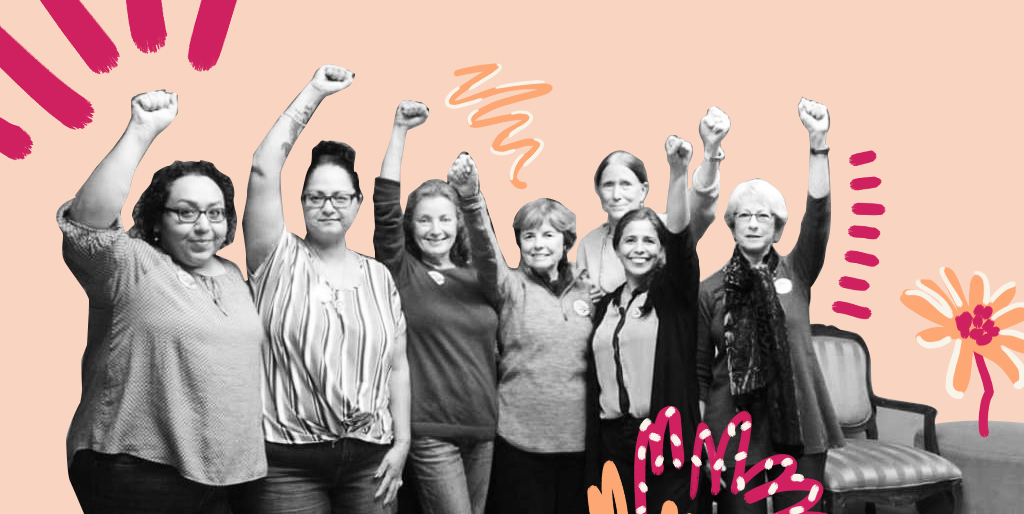These 'Angry Abuelas' Have Helped Thousands of Asylum Seekers

In the summer of 2018, when Cindy Candia heard about people living in dire conditions on the Pharr-Reynosa International Bridge, a thoroughfare along the Mexican-American border less than an hour from her house in south Texas, she knew she had to do something to help. The migrants, many of whom were seeking asylum in the U.S., were forced to wait on the bridge while awaiting a chance to cross the border.
That summer, Cindy, along with Nayelly Barrios, Jennifer Harbury and Joyce Hamilton, decided to travel to the bridge to see the situation firsthand. They brought along supplies to help make the desperate conditions a little more bearable: food, clothing, personal hygiene products, umbrellas to help shield asylum seekers from the intense summer heat, cardboard and mats for sleeping and later brought buckets to use as restroom facilities.
“The people living on the bridge told us they had to bathe from a water fountain,” says Cindy. They began to visit the area three or four times per week.
“A couple of weeks after our first visit, we met at Jennifer’s house to discuss how to organize our efforts,” says Cindy. Jennifer threw out a name for the group that summed up who they were — grandmothers and aunts — and how they were feeling about the situation at the border: Angry Tías and Abuelas was born. “We were so appalled that our government was making people live on the bridge," says Cindy. Shortly after, two more of their friends, Elizabeth Cavazos and the late Susan Law joined the group.
Eventually, the migrants were banned from living on the bridge, so the Angry Tías shifted their efforts to the McAllen bus station, about 20 minutes north of the border. That's where hundreds of asylum seekers recently released from detention ended up—they needed assistance in reading bus tickets, navigating travel plans and getting connected with resources. Angry Tías and Abuelas also began filling backpacks with emergency necessities and distributing them to whoever needed them.

Expanding Their Efforts
As they gained momentum, the Angry Tías and Abuelas began spearheading a number of other efforts. They set up free tiendas, or stores, in the Matamoros migrant camp, just over the Texas border in Mexico, and trained the migrants to run the shops. Here, anyone in need can come and pick up necessary items like toiletries, diapers and formula, and food items free of charge. They also began visiting asylum seekers in detention, offering them a friendly ear to listen to their stories and answer their questions, while also connecting them to pro-bono lawyers to help with their cases. They organized sewing projects to help asylum seekers make their own masks during the height of the pandemic—all from donations solicited via social media and their website.
To grow their efforts and help more people, Angry Tías and Abuelas began coordinating with local non-governmental organizations in the area, like Team Brownsville, La Posada Providencia and Senda de Vida Ministry. They’ve even helped motivate the creation of groups far from the border. Grannies Respond/Abuelas Responden started as a group of 30 people in Beacon, NY, many of whom were grandparents concerned about the health and safety of people seeking asylum. In July 2018, the group decided to travel to the border to protest the separation of children from their families and, as executive director Catherine Cole puts it, “make as much noise as possible.”
“People came out of the woodwork to help,” says Catherine. “They put us up in their homes on the way, and had potluck dinners for us the entire trip. It was quite amazing.” The group arrived at the border not as 30 people, but as 200.
While at the border, the group rented out a conference room and invited speakers, including immigration attorneys as well as representatives from Angry Tías and Abuelas, Team Brownsville and other groups, to share ideas.
“Out of that meeting came the realization that there was a need that we could fill in by going to the bus stations and replenishing diapers, formula, shoe laces, belts and shoes that are taken in detention,” says Catherine.
Thanks to the experience, Grannies Respond/Abuelas Responden now has groups in 13 states who are still working at various bus stations to help asylum seekers in whatever they need.
The Dangers of Helping
Meanwhile, the Angry Tías and Abuelas are dividing their time between two major projects. The first is ensuring the shelters in Reynosa, a Mexican border town, have sufficient supplies, as well as the ability to pay for things like electricity and water. Cindy crosses the border frequently, but takes care to maintain a low profile. Rather than announcing that she's coming by, or wearing their group t-shirts, she simply arrives with her supplies and quietly does the work. It’s dangerous and emotionally taxing, but Cindy says she believes they are meant to be there.
“It's sad seeing everybody living in the streets and in tents,” she says. “Some people just have cardboard that they're sleeping on with their babies. But when I go, I go on adrenaline.”
There are days when she and the other tías and abuelas have to take time off and recoup emotionally. “And then we just go back and do it again,” she adds.
The group’s other major ongoing project is helmed by Beverly Ortiz and Madeleine Sandefur, who, pre-pandemic, were regularly visiting asylum seekers who have been in long-term detention without court dates. The duo make sure those in detention have money in their commissary, are able to call family members and help them obtain attorneys in order to get their cases moving along.
“They have a much better chance of being released once we get involved,” says Cindy.
Once the migrants leave detention, Angry Tías and Abuelas work to get them transferred to shelters or other housing (including connecting them with host families). Sometimes they obtain airline tickets for them, too. Cindy also frequently works with LGBTQ+ asylum seekers to ensure their needs are met, as well.
“The LGBTQ+ community may be killed in their own country, so they come here to survive,” says Cindy. She says that many of the religious groups in Mexico as well as in the U.S. still aren’t welcoming or accepting of the queer community, so even when they do cross, they still face greater danger.

A Major Impact With Few Resources
Over the years, Cindy says the Angry Tías and Abuelas have helped around 15,000 asylum seekers. In 2019, the group was even awarded a Robert F. Kennedy Human Rights Award. But in recent months, news and social media buzz around the situation at the border has dwindled, and with it, financial support.
“We need money to buy more food for our shelters,” says Cindy. “Grants are hard to come by. We don't currently have foundations that give us money.” She says their funds come mainly from individual donors.
But Angry Tías and Abuelas shows no signs of slowing down. When asked what they want others to know most, Cindy says recognition of the humanity of the issue is most important.
“We hope that others will see it in their hearts to help a fellow human being, to help us to help them,” she says. “We're all human. That why we do what we do.”

This story was created as part of From Our Abuelas in partnership with Lexus. From Our Abuelas is a series running across Hearst Magazines to honor and preserve generations of wisdom within Latinx and Hispanic communities. Go to oprahdaily.com/fromourabuelas for the complete portfolio.
You Might Also Like

